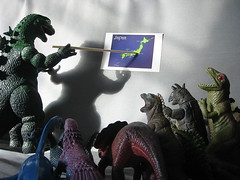Julie Evans - Project Tomorrow,
NetDay{My comments in brackets}
speak up: survey of k12 students/teachers/parents, open survey to all k12 schools -
communication #1/ self directed learning on rise/disconnect bet students and
adults on how students use tech and adults think they want to use
tech/sophistication of youngest users (elem level) {these are future, future
students}
dif ages have dif tech approach/ values - dif levels of digital natives
gaming universal among age levels - gender breakdown in younger groups, girls game as much as boys {talking about online gaming or console? will wii mean more female console gamers?}
9% of hi school have blackberry/ smartphone
use tech for research mostly, some only for keyboarding {not clear what this means}, increase in use of tech for presentations
25% email teachers/ 40% email or IM classmates/ 35% 6-12 interested in taking online classes (xtra help in sbj area #1 reason - supplemental assistance, math #1 class {interesting! seems would be hard to do math online to me}, also foreign lang)
lots of use of electronic presentations: ppt/eportfolios/movies etc
tech outside school: email&im/ gaming/ music/ myspace - music downloads has passed email/im as #1 use {take that metallica!}, myspace use has doubled (no gender/ demographic split, split in tech level - advanced group most likely)
{irony moment - her mic keeps cutting in and out when talking bout tech!}
fave comm tool? cell hone for talking (many don't have textable phone) - 36% 6-12 {look at phone policies in future for libs/ schools etc}
connecting big! connect w/ nonlocal kids (in us and around world) - 50% of gr 3-5 use tech to connect, 22% 3-5 have online friends never met (huge future issue), 44% 6-12 have 20 plus online friends
lots of connecting thru online gaming - big number game online w/ strangers everyday
22% blog/ 6% podcast/ 13% post videos on YT/ 16% share writings/ 51% on myspace/ 25% go to tv show websites for interaction
grades 6-12: control issues - rules against tech, feel stymied when want to use tech,
school filters, teachers control tech access {need to ease up on rules in public
and academic lib environment! start now cuz they're coming}
grades 3-5: access issues - lack of comps/ inconvenient locations/ slow access
huge degree of frustration in what they can do w/ tech at school, increasing perception of hi school experience {does this frustration continue when get to college? prob in some cases}
kids would provide: laptops for all students/allow phone mp3 etc use (46%)/ use IM and blogs (45%)/ lessons on iPod (34%)/ online textbooks (39%) {interesting - seem to want learning materials in variety of digital formats}
trends - spectrum of nativeness (dif levels)/ tech as tool (not fun or fad) - makes more effective and accurate/ connect without boundaries/ include student ideas in planning/ kids dont email to talk (except w/old people) - use email accounts for storage
Q: What is keyboarding?
A: Learning how to type. {Thanks}
Q: {Something about expectations of tech in college}
A: Think will have more access to tech in college and have all tech savvy teachers {hahahahaha - this got big laugh in room}
Q: {Privacy issues in social networking}
A: Kids are more self aware of privacy and sharing now. Trend towards backing off from major sharing online in MS etc as seen a year ago.
Q: {2nd life}
A: Kids interesting in potential learning in virtual reality environment. {Maybe 2nd Life Lib isn't such a bad idea!}



